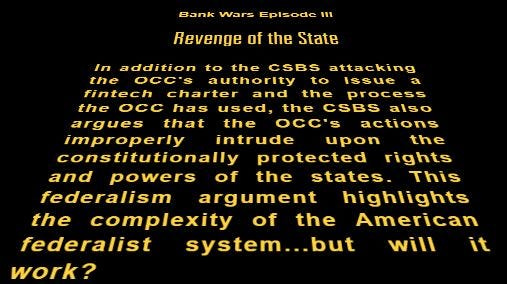Bank Wars 3: Revenge of the States
In the previous installments of Bank Wars we discussed the Conference of State Bank Supervisors (CSBS) arguments that the Office of the…
In the previous installments of Bank Wars we discussed the Conference of State Bank Supervisors (CSBS) arguments that the Office of the Comptroller of the Currency (OCC) lacks the authority to issue a non-depository fintech charter and failed to follow the necessary process to establish the charter. This edition will look at the CSBS’ third legal argument — that the OCC’s charter violates the United States Constitution’s Supremacy Clause and Tenth Amendment by improperly impinging on state powers without the necessary Congressional mandate.
To be clear, the CSBS isn’t saying that the federal government is incapable of offering a non-depository charter. Given the expansive interpretation of the interstate-commerce clause adopted by the Supreme Court that Congress can regulate “activities that substantially affect interstate commerce”, including activities that happen within one state but impact interstate markets, it is highly unlikely that Congress couldn’t establish a national fintech charter if it chose to do so.
But did it? The OCC (presumably) would argue that Congress did when they passed the National Bank Act (NBA). Now obviously Congress wasn’t thinking about blockchain or marketplace lending in 1864, or at the times the NBA has been amended, but Congress was thinking about creating a national banking system and empowering the OCC to manage it. The OCC hasn’t had to go back to Congress for new authority every time banking has evolved, so to the extent the fintech charter is a natural evolution of banking Congress intended the OCC to have this authority.
The CSBS on the other hand argues that because deposit taking is the essential component of banking the fintech charter falls outside the scope of authority Congress delegated to the OCC. The CSBS further argues that Congress has amended the law in the past to allow the OCC to offer other special purpose charters. Accordingly, the CSBS reasons, since Congress hasn’t amended the law to allow charters like the one proposed by the OCC, Congress did not intend for the OCC to issue such charters.
Why does Congress’ intent matter? Because courts tend to try to avoid federal preemption of state law. If the federal law clearly preempts states then the state law loses. If Congress meant to fully regulate an area then state law in the same area is preempted. If a party cannot comply with both the federal and the state law the state law is preempted; and if in a particular set of circumstances a state law would frustrate Congress’ intent the state law will be preempted. Otherwise, the state law remains. So if Congress didn’t intend to let the OCC establish non-depository charters like the one at issue then the NBA will not be read to preempt the states’ ability to regulate, precluding the charter.
So what did Congress intend? The OCC will want to draw the line broadly, arguing that Congress intended to give the OCC a lot of discretion. The CSBS will want to draw that narrowly, to only include traditional deposit banking and a couple of discreet and explicit exceptions. Who is right? Well, we will need to wait to find out.


